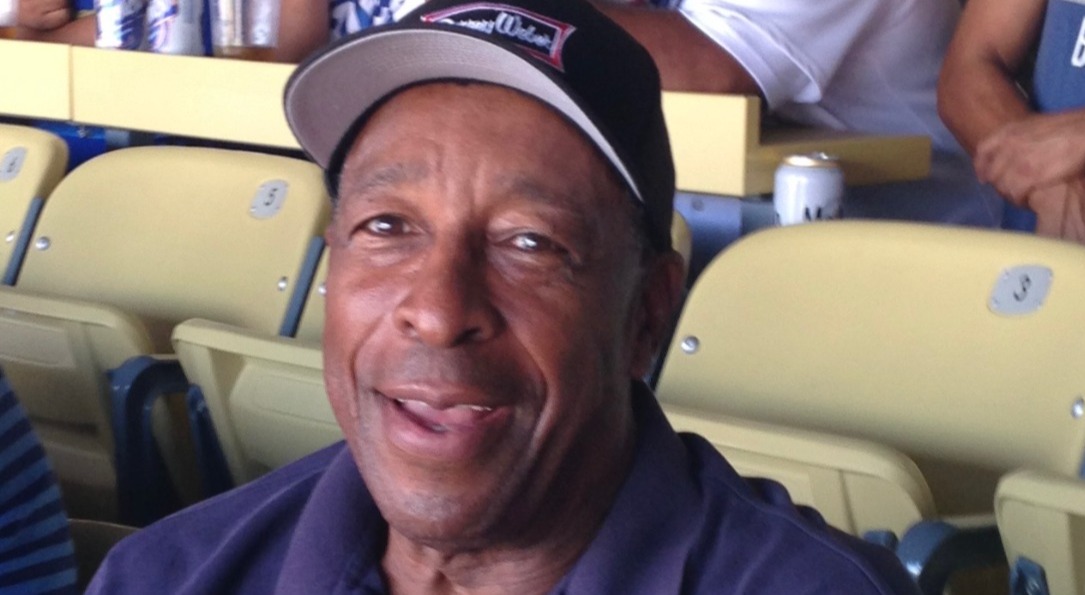Under their noted boxing trainer, White KOs Gold

The White team pummeled Gold over six brutal rounds in a 27-13 takedown May 15 in Culver City senior softball action. Pitcher Bill Tarrant took a brutal hit to the midriff off the bat of Ward Brown in the penultimate inning, sending him reeling around the infield doubled over in pain like a boxer going to the canvas, and providing a suitable image for the match.*
The boxing metaphor is a gesture to White’s manager, Prentiss Byrd, who was a corner man for some of the great fighters of the latter part of last century, including Tommy “the Hitman” Hearns. But it’s apt here. Like Hearns himself, White came out swinging and never stopped, scoring 14 runs in the first three innings. White thus avenged their own lopsided loss to Gold earlier in the season and sit just behind Ohdahorra and Gold in the standings.( Gold had not played in three weeks and was showing a bit of rust at times.)
“You gotta hit well, and we hit well and that’s how you win,” Prentiss told me afterwards. “Once a team puts their head down, you can’t win.”
Prentiss should know what that looks like. He worked for over a decade with the legendary Emanuel “Manny” Steward, a trainer and commentator for HBO Boxing known as “the godfather of Detroit boxing.” Over the course of his career, he trained 41 world champions, including heavyweights Lennox Lewis and Vladimir Klitschko. He died in 2012.
The famous Kronk Gym, where they worked, was “a small roach-infested basement” in a sprawling athletic facility in southwest Detroit, Prentiss recalls.
“I worked corners for Steward. Bring the water. Put the stool in. I was in the corner with Hearns, Lennox Lewis, and (light middleweight champion) Duane Thomas.”
The two split up in the early 1990s, and in 1997, Prentiss left the rusting city of Detroit, where he had lived all his life, for sunny Los Angeles to manage and promote fighters.
There was culture shock.
Boxing was already in rapid decline at the turn of the millennium, with dubious championship belts, Vegas spectacles, and proliferating pay-per-views. “Boxing has been dead for years. We’re just walking through the graveyard,” Prentiss once said.
And LA was a whole new kettle of fish. “Totally different (boxing) culture. Smaller fighters. Lots of Hispanics who spoke little English,” Prentiss said. “I’d get them trained up, then get a TV fight, but they couldn’t win. I had four or five fighters I had to feed their whole families. Detroit was different. Knew the families. Knew the culture. I could look them in the eye and know who they were.
“It was tough out here. I lost my ass,” Prentiss said.
That’s when he began working for media mogul Michael King, known for launching and distributing popular shows like "Oprah Winfrey," "Jeopardy," and “Wheel of Fortune.”
King, who died in LA in 2012 at the age of 67, hired Prentiss to build a gym for his latest project, “King Sports Worldwide.” The idea was to take skilled athletes and train them as boxers for a program called “All American Heavyweights,” to bring boxing back to its glory days.
“We took football players who couldn’t make it in the NFL and turned them into fighters. Most of them didn’t make it, but a few did,” Prentiss said.
After King’s death, Prentiss returned to managing fighters and found success with Charles Martin, who briefly held the IBF title in 2016 – after his opponent badly tore up his knee on loose canvas in the ring.
Prentiss, who recently turned 80, and whose ex-wife is KCAL-CBS news anchor Pat Harvey, has three sons and a daughter in various parts of the country, all with successful careers.
He’s been a part of the CCSSA community for nearly 25 years.
“The league has grown by leaps and bounds and is now one of the finest senior leagues in Southern California,” Prentiss said. “I’ve seen a lot of leagues, and this one stands out because we have managers and a community that cares. I’m proud of what we have now.
“I’m so happy at my age, I’m able to play with such great people.”
*Ward was devastated after the game, looking stricken and profusely apologizing. He called me the next day to see how I was doing. Other than a beautiful black and blue belt around half my waist, I’m perfectly fine. It was really my fault for failing to skip back into a defensive posture after the pitch, I told him.
0 Comments Add a Comment?